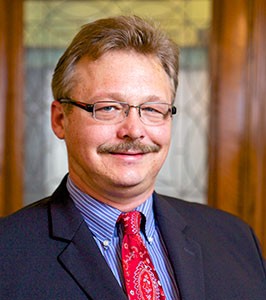
The 2015 Great Decisions lecture series opened on Feb. 6 with “Russia and the Near Abroad,” a hot topic about Russia’s recent aggression in Ukraine and its impact on the western world.
The lecture took place from noon to 1 p.m. in the crowded basement of the William Street United Methodist Church in Delaware. The keynote speaker was Sean Kay, a politics and government professor at Ohio Wesleyan University and the chair of the International Studies Program.
Kay was introduced by retired Major General Dennis Laich.
“We have in our community a world class performer in the arena of ideas and national security,” Laich announced during his introduction of Kay.
Kay began his talk by briefly mentioning the great divide between liberals and conservatives in Washington D.C. and how the United States, ever since the war in Iraq, has continuously struggled to balance doing the right thing and the realistic thing.
“It is about time that our allies stand up for themselves, I would argue that today that is actually happening,” Kay said as he listed off examples of how Germany and France – among other countries – are dealing with Russia’s recent aggression in eastern Ukraine.
“We are powerful when we are united with our allies,” Kay said after mentioning how Vladimir Putin’s ideal plan would be to cause fighting between NATO countries.
Kay warned that the involvement of the United States in Ukraine, including the addition of the Ukraine to NATO, could potentially be dangerous.
“It would mean America would have to defend the border of Russia and Ukraine, 300 miles away from Moscow,” Kay said.
On the other side of the argument, Kay brought up that Ukraine alone does not have the power to out leverage Russia. This is partially due to the unrest in the Ukrainian government – or lack thereof – and the large amount of Russians residing in eastern Ukraine who are in favor of Russian involvement.
According to Kay, the largest threat to Europe is Russia potentially penetrating the Eurozone (euro area). The Eurozone is a union of 19 European states that have taken in the Euro as their main form of currency. A small portion of these 19 states include territories formerly under USSR control during the cold war.
Kay finished off the lecture by suggesting that the United States move back to a geopolitical approach.
“We’re here today because we dealt with the Russians on the Cuban Missile Crisis,” Kay said. “Somehow we have lost the ability to play geopolitics.”
“Russia and the Near Abroad” concluded with a short Q&A.
The next lecture for Great Decisions will take place at William Street United Methodist Church on Feb. 13 from noon to 1 p.m. where privacy in the digital age will be discussed by Kirk Herath, chief privacy officer of Nationwide Insurance.
